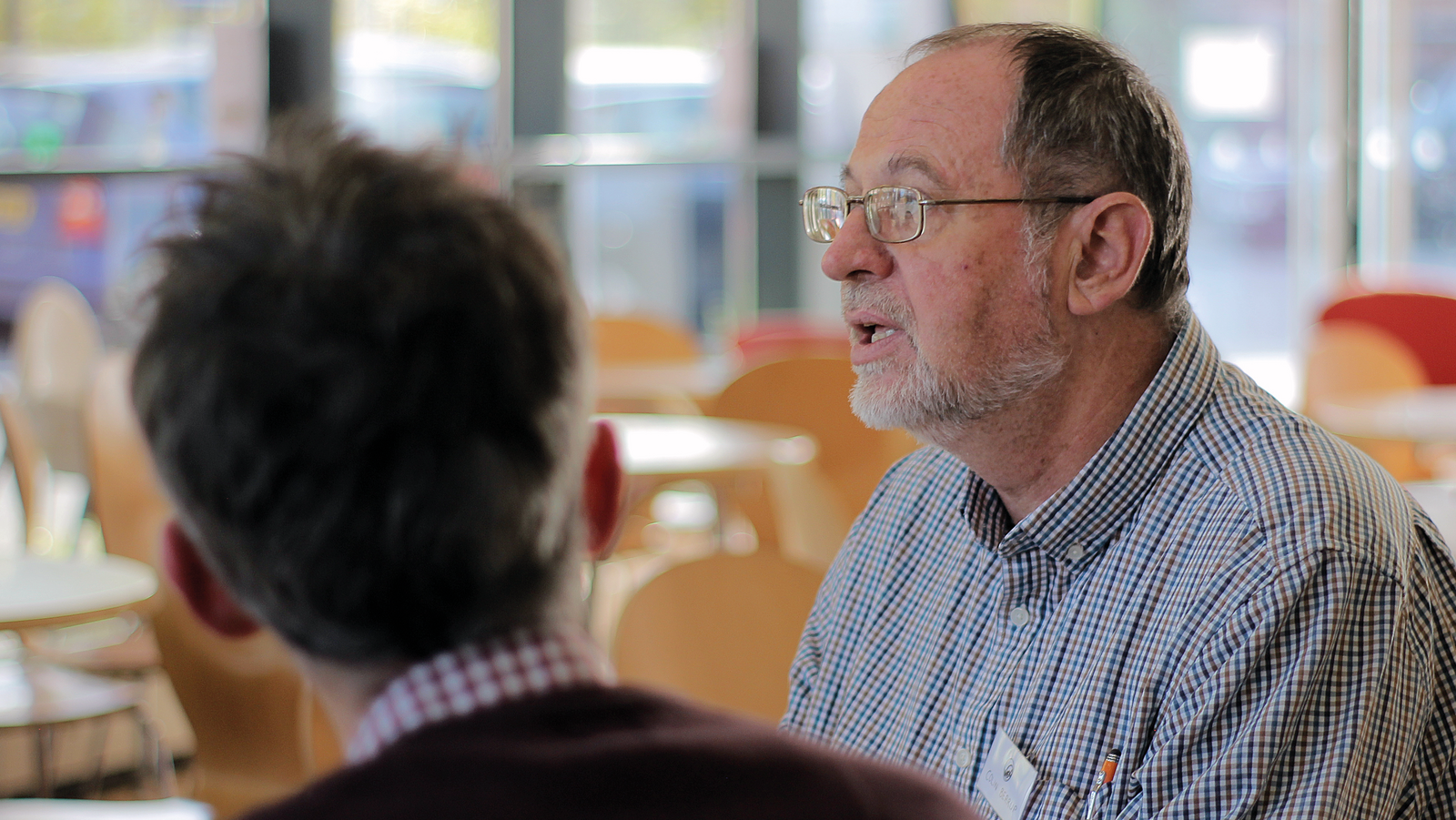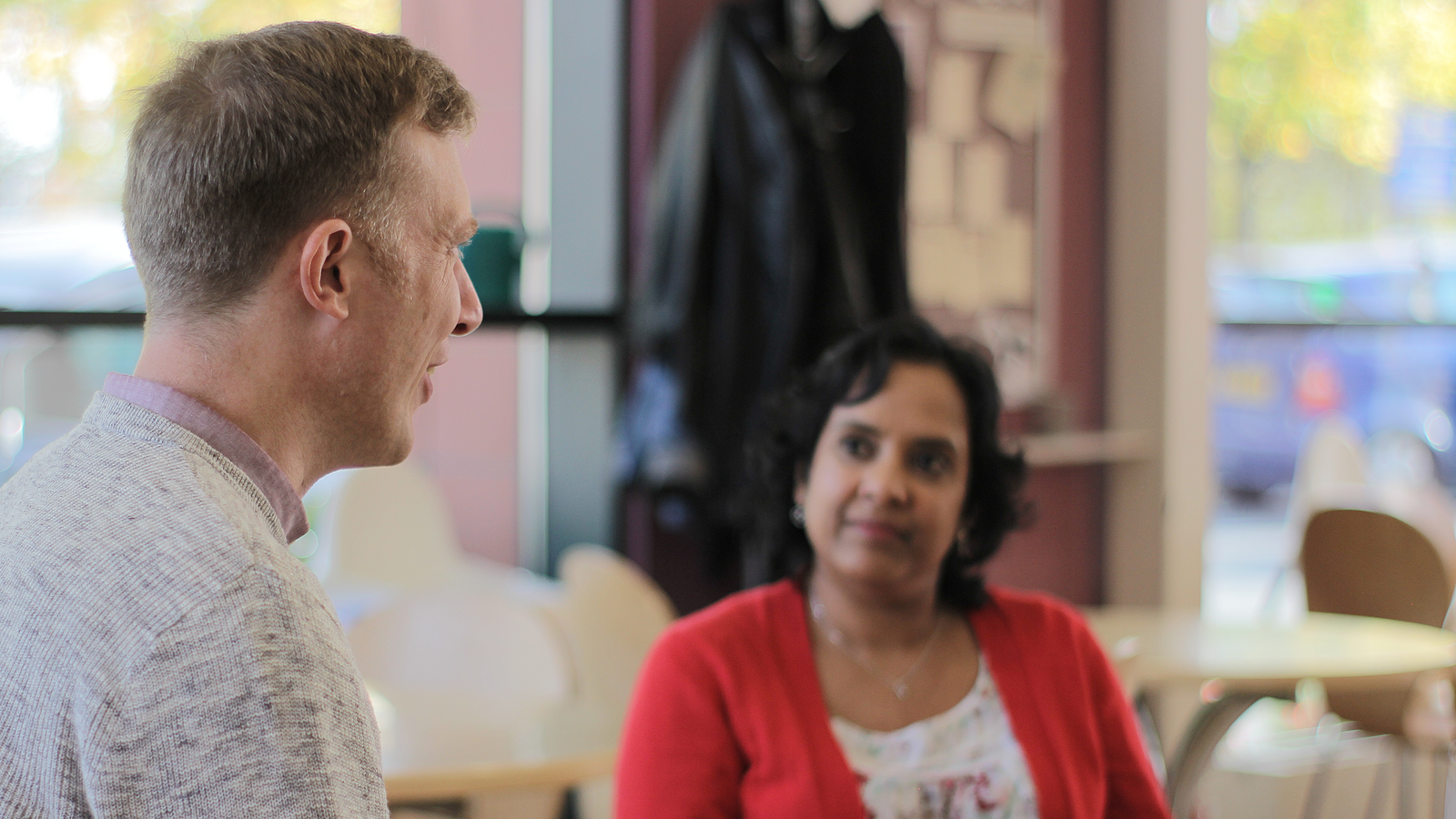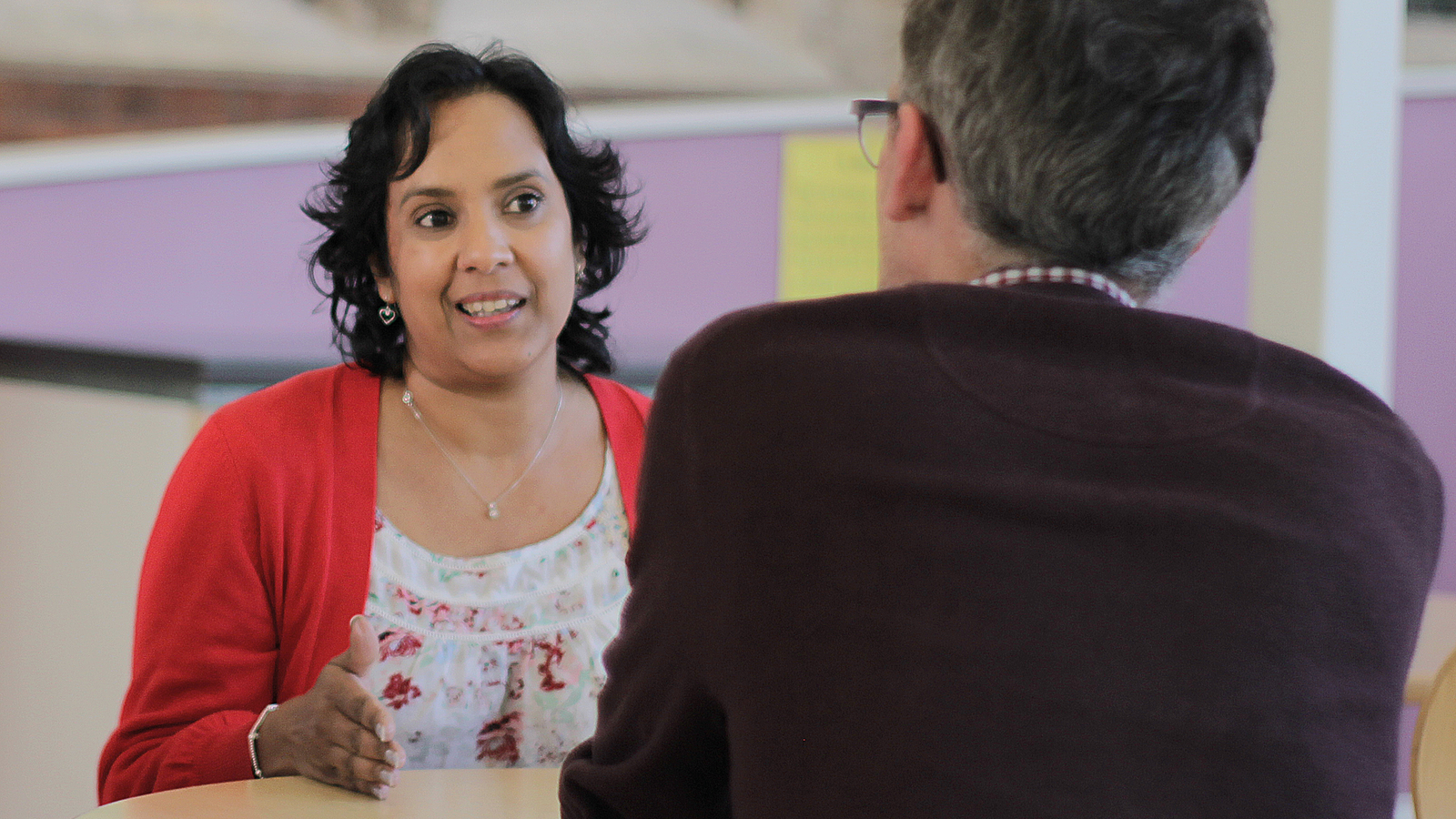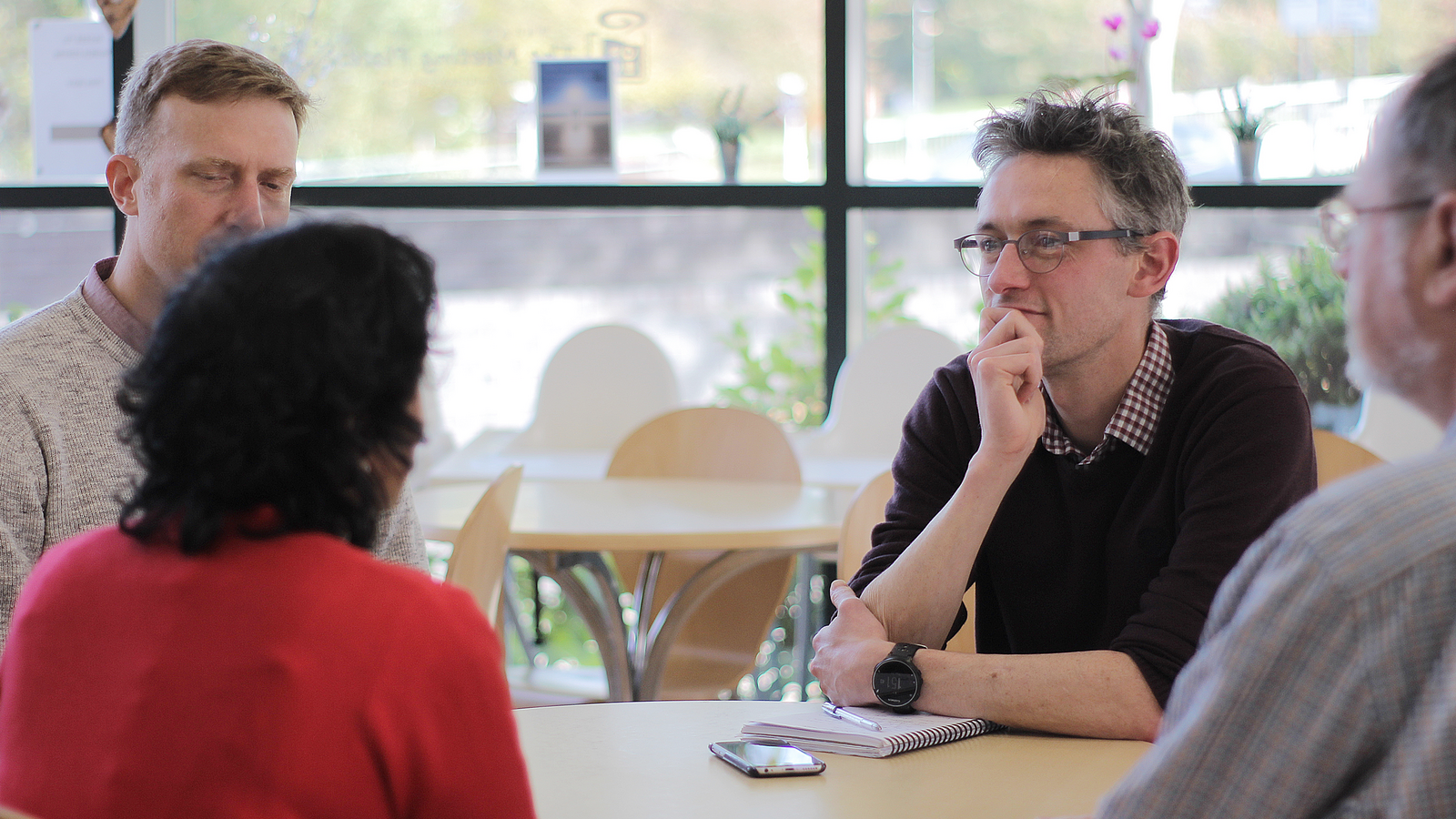We brought together three long-term members of WEC, with extensive experience of mission to other faith groups, to discuss what holiness means and how it is relevant to the people we are seeking to reach. What followed was a remarkable exchange of ideas. Simeon Whiting kept order.

Simeon and Colin at our round table discussion on holiness.
Simeon – In your experience, what is holiness?
Colin – Holiness, I think, is about separation – about God being separate from humanity. In the Old Testament, holiness was dangerous: if you stepped into the wrong place, you died. You get that stress on separation in most other religions, too.
Shely – Well, I come from a hindu, Brahmin background, and we believed we were born holy. The conflict came when my lifestyle didn’t match those expectations – because we were born holy but we still had to maintain that. I felt like a hypocrite! I knew I didn’t always have holy thoughts – do the right things. I felt I was putting on a front. A lot of the time, followers of other religions are trying to be holy from the outside, but Jesus comes along and he gives us his holiness.
Colin – Yes, Jesus turns it all inside out. He went into unclean places; to the home of a tax collector. He had dubious women washing his feet, he touched lepers and he imparted cleanness to the unclean. Instead of people going to the temple to be forgiven, to be healed, Jesus went to the people, healed them and said, ‘Your sins are forgiven.’ And then he extends that to us: unclean flesh, inhabited by a holy presence.
‘Jesus turns it all inside out. He imparted cleanness. And then he extends that to us: unclean flesh, inhabited by a holy presence.’
Simeon – So when holiness is seen as being about what you do, how do you do mission? Do you work with that kind of mindset or confront it with a different model of holiness?
Shely – I don’t think we should shy away from mentioning things like holiness. Because actually, they love that. The hindu community in particular will respect you more if you say you go to church. If you bring God into the conversation, they will respect that.
Colin – When I first got involved with Muslims, one of the struggles was the Arabic word for ‘holy’. There is a word but most of the Muslims I met didn’t understand it and I thought that meant that they had no concept of holiness. It’s rather that the lines are drawn in different places. The practice of holiness is very much there.
Malcolm – That’s interesting because Buddhists wouldn’t understand ‘holiness’ in the way that we would. It’s just that they don’t use the same wording. They speak in terms of attaining right wisdom, right conduct and right concentration but that’s not ‘holiness’ as such. The Buddhists I’ve known are very observant of the external. They need to see the outworking of holiness.
Shely – If anything, I think people need to hear that although I’m a Christian, I still make mistakes. They might think that if they become Christians, they have to be holy all the time. So I say, I have holy moments but I still have wrong thoughts, and I think it’s OK to say that.
Simeon – There’s an authenticity to that.
Shely – Yes, and a spirit of humility. I think people want to see that it’s OK to fail, as a Christian.

Shely discusses a viewpoint with Malcolm.
Malcolm – Through my time in Thailand, I’ve seen the value of that kind of authenticity. Thai Buddhists have come to the Lord after eight, ten, twelve years and said, ‘We’ve been observing the missionaries for the last six years – the way they treat their children, the way the husband holds his wife’s hand as they walk down the road.’ They come out with the smallest details. There’s something about that committed, long-term, faithful authenticity that’s very powerful.
‘I don’t think we should shy away from mentioning holiness. People of faith will respect you if you bring God into the conversation.’
Colin – And it’s not just personality. It’s always connected to the presence of God. Like Shely said, it’s OK to fail. The message is, ‘God is extraordinary and he accepts us. When we mess up, he is gracious.’ And then, living the reality of it.
Simeon – So when we relate to people of other faiths, we’re saying, ‘God has made us holy, not because of anything we’ve done but just because he is good.’
Colin – Well, there are positives and negatives to that. If we come across very blasé, it can just sound stupid and meaningless. But if you keep Jesus central – ‘I am not worthy, but the extraordinary thing is that he makes me worthy. I am not holy, but he makes me holy.’ – then it’s extraordinary, and you get people’s attention.
Simeon – Yes. But while God makes us holy, we still have ‘holy habits’, if you like.
Colin – There’s ‘positional holiness’ as with the Brahmins, and as with us in Christ. And there’s also ‘functional holiness’ in terms of lifestyle – because you’re holy, you should behave in a particular way. And so in most religions, because you are holy, you have certain codes – especially food codes. Because we are made holy in Christ, we have a different way of being holy. We do have food laws as well, but we forget about it: ‘I will never injure somebody by what I eat. Everything is clean, if I give thanks to God for it.’ Our holiness code is rooted in love – we’re paying attention to others’ needs, not our own.
Malcolm – In Leviticus 19 – a well-known ‘holiness’ passage – you have a whole list of things, including, ‘Be holy because I am holy’, but in that list you also have, ‘Love your neighbour as yourself’. So out of the whole ‘holiness’ chapter, the thing that Jesus pulled out was not, ‘Be holy’; it was, ‘Love your neighbour’. And that is how we express that we’re holy.
Colin – I saw that illustrated in a story from India. There was some awful disaster going on and there were loads of Indian people struggling and there was a Christian going to help them, and she passed two ‘holy men’ sitting on a wall. She said to them, ‘Come and help!’ And they said, ‘We’re not going to help. We’re holy people!’ It violated their holiness to pitch in, in all the blood and the muck. So christian holiness is radically different. It doesn’t always attract people because it also scandalises. With some people, it will resonate with their heart and they will say, ‘Wow! This is better and higher!’ With others, it will really offend them.

Malcolm: ‘Love your neighbour’. And that is how we express that we’re holy.
Malcolm – In the buddhist context, my experience has been that there’s holiness of a sort: they have the four noble truths and one of those truths is the eightfold path – the ‘middle way’ – right thinking, right mindfulness. And that would be the sort of moral code. They may perceive other religions as indirectly achieving holiness through appeasing a third party god. A Buddhist would say that we are our own saviours; we make ourselves holy. So there are seven billion saviours in the world.
Shely – Thinking about holiness and where it is, I remember when I was growing up, my mum had a bottle of water which she had carefully collected from the Ganges in India. And if she wanted to make something holy, she would open the bottle and sprinkle it, and that thing – whether it was a table or a plate or even us – would become holy. This concept of holiness: again, it’s something that’s outside us that’s going to make us holy.
Colin – Of course, with Islam, you’ve got Mecca in Saudi Arabia. (There are lesser shrine sites but Mecca is the supreme one.) And it’s a connection with the past, with that sacred space. There’s a liminal process to go into it – you have to change your clothing, along with everything else. And one of the things you get from there is holy water: Zamzam water, from the well from which Mohammed drank and Ishmael’s mother drank. So again, there’s that notion of the holy thing you bring home.

Shely and Simeon at the discussion.
Simeon – Changing the subject a little, WEC was started over 100 years ago, with holiness as one if its pillars. But does holiness mean the same thing now as it did in 1913?
Colin – I think in Britain, there has been a change. Holiness used to be measured and marked in a lot of external ways – in respectability. And sometimes that’s led to licence, where there isn’t really any holiness, but then there’s a corrective to Jesus-style holiness – very much about his person and how he behaves, not about observation of customs and rules.
Simeon – So holiness is about emulating Jesus.
Colin – Yes, but I think if you go back to 1913, the popular christian culture may have had these superficial things, but there were also people who really got it.
Malcolm – I find Galatians a fascinating book. In Galatians, Paul is grappling with law and licence and he’s saying no to law, but he’s also saying no to licence. Because these are the two ways we always seem to go – we flick between the two. And Paul says, ‘It’s neither. The answer is the Spirit – being in step with the Spirit.’ And that might look different, day by day. In the past, I think we’ve seen it as two options – law or licence – where Paul very clearly says there’s a third way: it’s by the Spirit.
Shely – In 1913, we probably had much higher church attendance. Holiness in terms of what the word of God says, hasn’t changed but, in 1913, many more people would have called themselves Christians. People probably had a slightly different idea of what holiness was. Going to church was…
Simeon – It was just kind of the ‘done thing’, wasn’t it?
Shely – Exactly.
‘I think there’s a realisation today that there isn’t as neat a divide between the sacred and the secular as we’d thought. What if everything is sacred? What if the Lord is Lord of all of it?’
Colin – But we now live in a world where nothing is sacred. There’s nothing you can’t say, there’s no place you can’t go. For us as Christians, I think we’re understanding holiness from a different angle. We’re coming out of ‘nothing is sacred’ and building from zero, rather than deconstructing lots of phony holiness.
Malcolm – I also think there’s a realisation today that there isn’t as neat a divide between the sacred and the secular as we’d thought. But maybe we’re still trying to work through how to apply that to our daily lives. I’m hearing from a lot of people that they’re wrestling with whether holiness looks the same on a Tuesday as it does on a Sunday. How do you bring the sacred into that context? What if everything is sacred? What if the Lord is Lord of all of it?

Bringing God into the conversation.
Join the conversation
Does anything in this discussion stand out to you as particularly insightful? Or is there something you would disagree with? Get in touch and tell us what you think.




